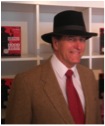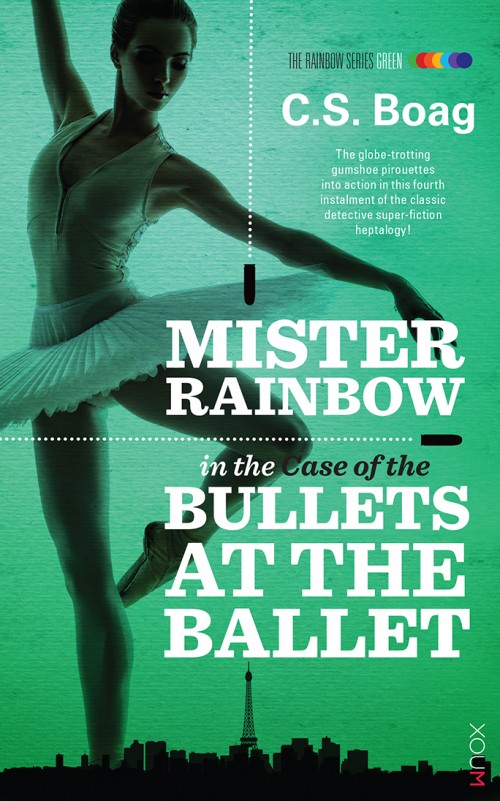 Over a long writing career, C. S. Boag’s work has featured in numerous publications, including The Sydney Morning Herald, the former Sydney Sun newspaper and The Bulletin magazine. His first story appeared in Sydney University’s Honi Soit magazine and a number of his short stories have been published since.
Over a long writing career, C. S. Boag’s work has featured in numerous publications, including The Sydney Morning Herald, the former Sydney Sun newspaper and The Bulletin magazine. His first story appeared in Sydney University’s Honi Soit magazine and a number of his short stories have been published since.
A former columnist and feature writer, he is a winner of the Walter Stone Memorial Prize for Literature. In the Mister Rainbow series the Hood with No Hands, Death of a Ladies’ Man, Horses for Corpses and Bullets at the Ballet, have already been released by Xoum publishers, with The Cock Robin Killer to be released later this year.
C. S. has travelled extensively and lived both here and overseas. He feels he speaks enough French not to die there.
He says he has renovated too many houses, driven too many taxis and bulldozers. He was a councillor on the Sydney City Council for what he calls a ‘chilling couple of years’; and has also worked in a hamburger bar, taught English, laboured and performed other tasks ‘too arduous to mention’. He has five children and now lives with his wife Judith on a small holding near Bathurst.
Find him at www.csboag.com
Author interview
You mentioned that you started later in life as an author. How did the idea for the Mister Rainbow series take shape and what drove you to keep going and to complete your first book in the series?
There came a time in my life when I found myself living (illegally) on a boat in Sydney Harbour with a rainbow lorikeet and plenty of time to write. Naturally enough the idea of writing a detective series occurred to me, about a retro detective who had no identity because too many people were after him, including a nemesis called Pandora.
At the time, I was attending a course at the Writers’ Centre run by thriller writer Alan Mills. Alan proved to be a total inspiration. An assignment he set was to introduce a character in a selected genre – I chose crime and Mister Rainbow. The feedback was positive, so I continued…
There are seven books now in the Mister Rainbow series. What is it about the Mister Rainbow character that keeps calling you back to write more of his story?
As I told my son Jack after he read the first book in the Mister Rainbow series, I chose a character as much unlike myself as I could — a bit of a klutz, in fact, with very bad dress sense and terribly bad luck with women. There was a long silence when I told him — it was a long distance call — then Jack said, ‘Dad, it’s you’.
I thought that was unfair, and I still do. Still, what calls me back to writing more Mister Rainbow stories (apart from wild acclaim from a massive readership) is the fact that Rainbow writes the books for me. I’m afraid my odd assortment of characters has taken over. They decide what’s going to happen and what they’re going to say — all I’ve got to do is pedal the typewriter.
Who has influenced you in your creative writing?
The three great influences in my creative writing life are as follows: all the magnificent books I’ve ever read — I am a readaholic; Alan Mills, who taught writing like it really is (and has become a good friend in the process), and my total inspiration and agent, my wife Judith. I write full-time with no time or talent to promote the books, but Judith performs this task extraordinarily and enthusiastically.
What is the best piece of writing advice you have been given?
My best piece of writing advice came from Alan Mills. It was: ‘Don’t let anything get in the way of your writing,’ although he since denies ever saying anything of the kind. It is a truism that authors look for any excuse they can to avoid writing. What Alan taught me was that there is no real excuse. Apart from that, Dorothea Brande’s advice in, Becoming a Writer, to have a set place and a set time to write and when you are there, write. I have also discovered that I must have faith in myself and write for the reader.
What are you reading at the moment?
What am I reading at the moment? Wait for it — I confess that I have just finished reading Marcel Proust’s mammoth work Remembrance of Things Past — strange fare for a writer of pulp fiction, but, apart from being extraordinary in itself, it contains some great tips on writing. And I am now reading Leonard Cottrell’s The Bull of Minos, on Greek archaeology, by way of research for the sixth book in the Rainbow series, The Morgue the Merrier. Go figure.
Mister Rainbow lives illegally on a boat in Sydney Harbour, which sounds like a pretty good life. Do you own a boat?
Living on a boat in Sydney Harbour was the pits. The sea’s unpredictable and because it’s illegal to live on a boat in Sydney Harbour I, too, often found myself cowering in the cockpit hiding from the water cops. Because my daughter Kate is an animal lover, I shared the boat with a lot of animals. I had to row two incontinent dogs ashore in the middle of the night and the boat became infested with fleas. I was happy to sell the boat. But happier still that it led to my becoming an author.
Excerpt from Mister Rainbow in the case of the Bullets at the Ballet
What do you need?’
‘A temporary passport.’
There’s no hesitation.
‘We can do passports.’
‘It’s got to work but no-one can know it’s me,’
I continue. ‘I’m a non-person. I haven’t got an identity, and if I didn’t need a passport real bad, I wouldn’t be asking for one.’
‘Okay, I’ll have to guess what you look like,’ Ace says, ‘based on no more than the remembrance of things past. And after that, find a match among the passports of dead men.’
‘Can you do that?’
‘Consider it done, Rainbow. And after it’s done, consider it forgotten. Now is there anything else – apart from the passport of a dead man who looks like what I think you look like after forty years?’
‘He’s got to be bald.’
‘We can do bald. Anything else?’
I reach across the space between us, find his gloved hand with my ungloved one, and palm him the picture from the hire-car joint.
‘If you know everything about everyone, tell me who this is and where he went.’
‘No problemo.’
The stereo churns out Song of Joy. I like Song of Joy. It’s not just the words. Music says stuff you can’t put into words.
Like vain hope in the face of impossible odds, confronted in darkness.

